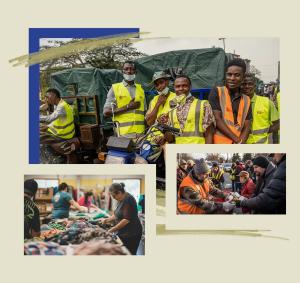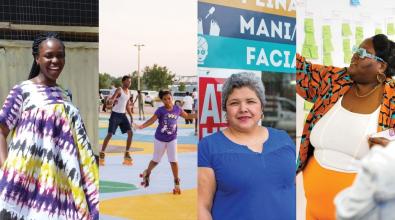 Read More
Read More
Mayors deploy new strategies to tackle migration challenges

Photos courtesy city of Denver and Freetown City Council
Listen to This Article
There are a record 120 million displaced people across the world, and an estimated 70 percent of them are seeking to build their futures in cities. The resulting and historic levels of migration are stretching local-government coffers and capabilities like never before, prompting many local leaders to lean on one capacity in particular: innovation.
In New York City, that resulted in the creation of a new agency specifically designed to help some of the more than 200,000 migrants who have arrived in the past two years. In Denver, it prompted the mayor to stand up a comprehensive system of services—including a path to work authorization—for 42,000 newcomers while also developing a playbook to share support strategies with other leaders around the country. And in Freetown, Sierra Leone, it meant creating new pathways for integrating aid for migrant workers into other citywide priorities.
In doing this work, cities are also tapping a key leadership capacity emphasized by Bloomberg Philanthropies’ Government Innovation programs: the ability to effectively respond to crises. As Denver Mayor Mike Johnston tells Bloomberg Cities, “You have to take big swings if you’re gonna take on hard problems” like migration.
Here are some of the latest approaches city leaders around the world are using to address migrants’ needs and integrate newcomers more broadly into communities and future economic development plans.
Creating agencies and partnerships to accelerate inclusion and access to work.
Innovative mayors are always ready to identify cases when existing institutions and ways of working aren’t suited to dynamic challenges, and, when necessary, start something new. Migration and asylum are examples of issues that can benefit from this approach.
New York City, for example, was determined to help new arrivals overcome some of the many federal barriers that often stand in the way of their full participation in society. So it created the Office of Asylum Seeker Operations and launched an Asylum Application Help Center to help the hundreds of thousands of migrants who have arrived in the city over the past two years. The Help Center—which taps interpreters and pro-bono legal aid through private law firms and local universities—offers applicants one-on-one appointments, and has already helped process tens of thousands of applications for temporary protected status, asylum, and work authorization.
Even if a city is not in position to start a new agency focused on issues facing migrants, they may still be able to follow this model by forming partnerships with local universities to help guide new arrivals through processes such as filing asylum claims. In New York, colleges working with the city agreed to offer course credit to students who help migrants with claims.
Meanwhile, in Tulsa, Okla., local leaders are using a new institution less to provide triage services to migrants and more to make theirs a welcoming city more broadly.
To that end, they have launched the Immigrant Community Development Corporation, an institution focused on providing comprehensive support and wealth-building opportunities to immigrant entrepreneurs.
Rodrigo Rojas, the managing director for community development in the Tulsa Department of City Experience who sits on the corporation’s board, says the new institution was born out of the city hearing from many newly arrived residents that they wished they had found ways to acquire more assets early on. “That turned a light bulb on for us,” he says.
Among the corporation’s first concrete projects: an immigrant business incubator that provides a venue for workshops and classes and an international market-themed retail space for immigrants to sell products and test market approaches. “New Tulsans,” as the city calls them, will be able to access everything from basic technical support for tasks such as opening a bank account to a network of peers facing some of the same struggles they are.
It’s all a part of a larger effort to welcome people and, as Rojas explains, provide “an example, right here in the heartland of our country, of what inclusive economic development looks like.”
Combining local efforts around the country and the world.
Denver Mayor Mike Johnston was focused solely on solutions for his own city when he began holding daily “tiger team” meetings with cabinet heads from each relevant agency to address the city’s surge in migration, which, by early this year, was greater than in any other U.S. city per capita. As his city created new pathways to provide medical care and shelter, secure work authorization, and fast-track asylum for these people—and overcame budget obstacles in order to do so—Johnston realized his experience might help other mayors. “We wanted everyone else to benefit from the lessons we had learned,” says Johnston, who is part of the newest class of municipal leaders participating in the yearlong professional management training program at the Bloomberg Harvard City Leadership Initiative.
So in April, the mayor and his team published their own 15-step playbook, including concrete actions fellow local leaders can take in this critical moment. Those steps include practical advice on everything from working effectively with state and local partners to creating a single point of entry for reception and intake to assigning each new resident a case manager to carefully managing donations from those in the community who wish to help migrants in need.
One simple step that the playbook advises mayors to take as they get started on this work: lean on their local data capacity to keep track of basic demographic information that can help make the case for greater federal support in their city.
“I'm always grateful when other mayors that have cracked the code of a big idea will share,” Johnston says, adding, “We have no pride of ownership. We're just delighted to get it implemented as far and wide as possible.”
Integrating migrant issues—and solutions—into larger city priorities.
Even as they work to provide critical services in a timely fashion, cities are also acknowledging that what is now, in some cases, a crisis will, tomorrow, be a fact of life. And in Freetown, Sierra Leone, the city is finding ways to make a population influx driven in part by climate-change impacts part of the solution.
Specifically, Mayor Yvonne Aki-Sawyerr—who has also participated in the Bloomberg Harvard City Leadership Initiative and whose city’s project tackling deforestation won the 2021 Bloomberg Philanthropies Global Mayors Challenge—is integrating new arrivals into the city’s work on sanitation. In practice, that means hiring hundreds of migrant youth who are now using city-provided tricycles to collect household waste, an effort Aki-Sawyerr is carrying out in partnership with the Mayors Migration Council, a coalition of global mayors she helps lead.
But this isn’t just a one-off community engagement project or jobs program. It’s part of a holistic effort to tackle a series of interconnected challenges. And there’s no bigger reflection of that than the fact that this work is led by Eugenia Kargbo, the city’s (and continent’s) first chief heat officer. “In Freetown, most of the people that are coming into the city are coming in because of the climate issues that they face,” Kargbo, whose portfolio also includes sanitation issues, tells Bloomberg Cities.
Going forward, the city’s approach to migrants will be embedded in its development plan, rather than treated as a separate problem. This effort speaks to the potential for other cities to find incremental ways to incorporate new approaches to migration into existing service delivery and other priorities, rather than needing to start brand-new migration plans from scratch. In fact, Freetown’s newest development plan, launched last month, includes a commitment to continuing its work with migrants as part of its long-term climate agenda.
As Mayor Aki-Sawyerr tells Bloomberg Cities, “We are committed to building a Freetown where everyone can thrive.”

